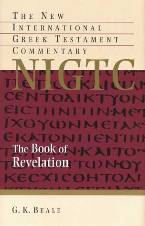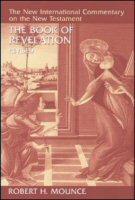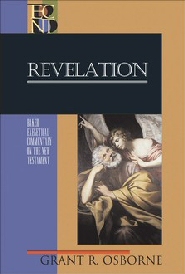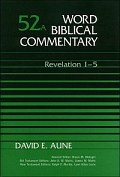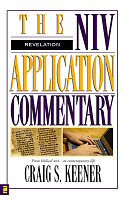Best Resources on Revelation
Revelation draws back the curtain on the unseen realities of life for God’s people. There is a spiritual battle going on, and the risen Jesus reveals these visions to John so that God’s Church will be aware of what is happening now and in the future. While the strange imagery might seem frightening, the ultimate message of Revelation is a hopeful one: although evil appears to triumph, God remains on the throne.
—Faithlife Study Bible, Lexham Press
Everything You Need to Study & Teach Revelation
Expository Preaching Kits are curated resources all focused on helping you teach a single book of the Bible—keeping you prepared without weighing you down.
Best Commentaries on Revelation
G. K. Beale, New International Greek Testament Commentary (NIGTC), Eerdmans, 1999, 1,309 pp.
Engaging important questions concerning the interpretation of Revelation in scholarship today, as well interacting with the various viewpoints scholars hold on these issues, Beale's work makes a major contribution in the much-debated area of how the Old Testament is used in the Apocalypse. Approaching Revelation in terms of its own historical background and literary character, Beale argues convincingly that John's use of Old Testament allusions—and the way the Jewish exegetical tradition interpreted these same allusions—provides the key for unlocking the meaning of Revelation's many obscure metaphors. In the course of Beale's careful verse-by-verse exegesis, which also untangles the logical flow of John's thought as it develops from chapter to chapter, it becomes clear that Revelation's challenging pictures are best understood not by apparent technological and contemporary parallels in the twentieth century but by Old Testament and Jewish parallels from the distant past.
- Level: Advanced
- Type: Technical
Robert H. Mounce, New International Commentary on the New Testament (NICNT), Eerdmans, 1997, 475 pp.
When first published, this volume on Revelation by Robert H. Mounce was widely praised as a standard commentary on the Apocalypse. Mounce engages seriously with the various approaches to interpretation and with the conventions common to apocalyptic literature. In affirming more directly his own reading of the Apocalypse, Mounce steers a middle course between an extreme literalism and a highly imaginative subjectivism, believing this to be the way the ancient text spoke to the first-century churches to whom it was addressed—and the way it still speaks to us today.
- Level: Intermediate
- Type: Expository
Grant R. Osborne, Baker Exegetical Commentary on the New Testament (BECNT), Baker, 2002, 896 pp.
Osborne begins with a thorough introduction to Revelation and the many difficulties involved in its interpretation. He discusses authorship, date of writing, and the social and cultural setting of the work. He also examines elements that complicate the interpretation of apocalyptic literature, including the use of symbols and figures of speech, Old Testament allusions, and the role of prophetic prediction. Osborne surveys various approaches commentators have taken on whether Revelation refers primarily to the past or to events that are yet future.
- Level: Advanced
- Type: Technical
David E. Aune, Word Biblical Commentary (WBC), Thomas Nelson, 1997–1998, 1,869 pp.
An advocate of source criticism and an expert in early Christian prophecy, David Aune examines the full range of secular and biblical literature in search of possible sources for the striking literary devices in Revelation—over three volumes and more than 1,500 pages. His mastery of an incredibly broad range of ancient writings enables him to compare every pericope of Revelation to the literary traditions of the ages that preceded its writing, and thus to evaluate the possible sources for the forms John employed to write his vision. Aune’s detailed introductory comments scrutinize the entire expanse of this mysterious book, providing a monumental treatment of Revelation’s textual history.
- Level: Advanced
- Type: Technical
Craig S. Keener, NIV Application Commentary (NIVAC), Zondervan, 2000, 576 pp.
The book of Revelation can be intimidating to encounter and daunting to apply. Yet in his volume on Revelation, Craig S. Keener reveals the transitions, the structure, and the benefits of learning to read the Bible in context. He helps readers understand apocalyptic literature not only for its own sake but also for the benefit of the Church and for practical application in the lives of ordinary Christians.
- Level: Intermediate
- Type: Devotional
Best Books on Revelation
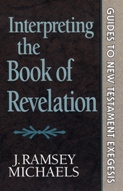
Interpreting the Book of Revelation
Interpreting the Book of Revelation provides a concise introduction to the careful interpretive study of Revelation. Its meticulous, scholarly approach to studying linguistic structure, vocabulary, and variant readings provides and exegetical model even for those who disagree with some of the author's conclusions.
Learn more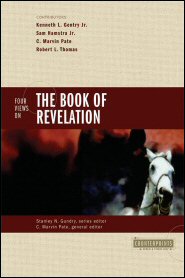
Four Views on the Book of Revelation
Is the book of Revelation a blueprint for the future that needs decoding if we want to understand current events? Is it a book of powerful imagery, with warnings and promises for the Church throughout the ages? Or is it essentially an imaginative depiction of historical events in the first century? Four Views on the Book of Revelation explores the four main views in which Revelation is understood: preterist, idealist, classical dispensationalist futurist, and progressive dispensationalist.
Learn more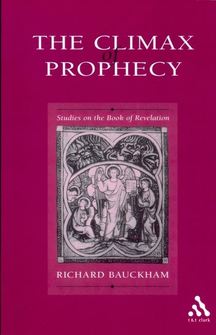
Climax of Prophecy: Studies on the Book of Revelation
The Apocalypse of John is a work of immense importance and learning. Yet among the major works of early Christianity included in the New Testament it has received relatively little scholarly attention. This work is a significant contribution to remedying this neglect. The author examines the meticulous literary artistry, creative imagination, radical political critique and profound theology of the Apocalypse of John. It is a sustained enterprise to understand both the form and the message of the Apocalypse in its literary and historical contexts. An invaluable and illuminating work for students, scholars, and ministers.
Learn more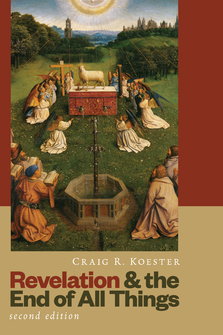
Revelation and the End of All Things, second edition
Since its first publication in 2001, Revelation and the End of All Things has been a highly readable guide to one of the most challenging books in the Bible. Engaging the questions people most frequently ask about Revelation and sensationalistic scenarios about the end of the world, Craig Koester takes his readers through the entirety of Revelation, offering perspectives that are clear and compelling.
Learn more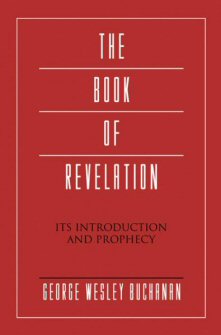
The Book of Revelation: Its Introduction and Prophecy
In this substantial volume, academic George Wesley Buchanan turns his attention to the book of Revelation, presenting his remarks from an intertextual point of view. Taking each chapter of Revelation at a time, Buchanan examines the text and literary ramifications and then gives insightful commentary. Comparing to other Scripture texts as well as historical and social contexts, Buchanan’s work on Revelation is essential to any student of the Apocalypse. He also provides an introduction to intertextual discourse, a conclusion, and a list of helpful appendices.
Learn moreBest courses on Revelation
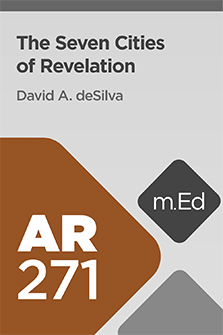
Mobile Ed: AR271 The Seven Cities of Revelation (2 hour course)
In this course, Dr. David deSilva provides a visual tour of the local contexts of the seven cities addressed in Revelation. Beginning at the island of Patmos, Dr. deSilva examines the archaeology of these sites, explaining what this can tell us about the everyday world the early Christians encountered in these places. This course—enriched with photographs of the sites—will give you a sense of how the first audiences in these cities might have encountered the visions and oracles of Revelation.
Learn more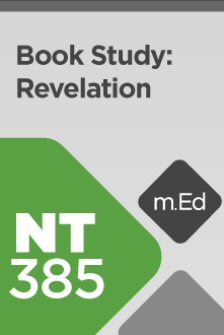
Mobile Ed: NT385 Book Study: Revelation (9 hour course)
Examine one of the most exciting and controversial books in the Bible with Dr. Keener’s commentary on the book of Revelation. Explore the challenging aspects of the book as well as the beautiful elements that invite us to worship God. Dr. Keener focuses on the themes in Revelation, including prayer, suffering in light of hope, and how the Spirit empowers us to share Christ with others.
Learn more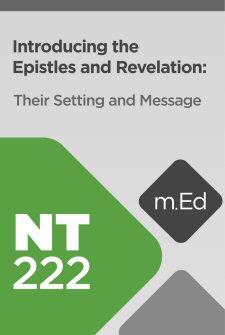
Mobile Ed: NT222 Introducing the Epistles and Revelation: Their Setting and Message (12 hour course)
This course explores the books of Romans through Revelation with particular attention to their historical setting and culture. In addition to providing an overview of each book, topics such as authorship, audience, theology, major themes, presenting problems, and pastoral strategies are discussed in depth.
Learn more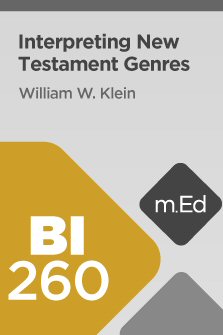
Mobile Ed: BI260 Interpreting New Testament Genres (9 hour course)
Develop a new level of competency in interpreting the New Testament with Dr. William Klein’s guidance and insight on New Testament genres. Learn how to interpret the different genres found in the New Testament Epistles. Distinguish which events in Acts are meant to be descriptive—describing what happened—and which are meant to be prescriptive—instructing on how to live. Discover how the book of Revelation combines three genres and how this affects its interpretation.
Learn more